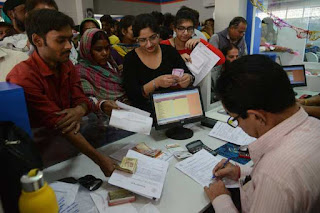Introduction
The Cabinet in India has brought in an ordinance to
impose a penalty for possession of the scrapped notes beyond a cut-off point.
The penalty of possessing the demonetized Rs. 500 and Rs. 1000 notes beyond
certain numbers may even include a jail term or 5 times the value of the seized
notes or both. In this blog, we will look at the salient features of this
ordinance for the benefit of readers.
Ordinance to Curb Old Note Hoarding
In a swift move, just before the window period of
exchange of old notes with new ones comes to an end, the Bharatiya Janata Party
government at the center promulgated an ordinance to curb the possession of old
legal tender after March 31, 2017 when the RBI window for exchange of old notes
also ends. The Central government will now send the ordinance to the President
of India for the final approval.
According to this bill, the possession of more than 10 old notes will
become punishable by law. The authorities can levy a fine of Rs. 50,000 or five
times the total value of notes in possession, whichever is lesser. However, the
official sources could not say whether the penal provisions would apply for
holding the junked currency after the 50-day window period to deposit them in
the bank ends on December 30 or the final window of note exchange in selected
branches of Reserve Bank of India (RBI) comes to an end on March 31, 2017. The penalty may also include a jail term of
up to 4 years in certain cases.
Ordinance on Limiting Government Liability
The
Cabinet headed by Prime Minister Narendra Modi also approved an ordinance to
bail the government and the central bank from future litigation. In a
thoughtful move, the Finance Ministry, working with Law Ministry, has brought
an amendment to the RBI Act to extinguish the liabilities of the government and
the central bank on the demonetized high-denomination notes. This move will
help the government to stand in good stead when citizens and opposition parties
try to corner it through a battery of future litigation in the courts of the
country.
Demonetization Policy
While announcing the demonetization of the old currency on November 8, 2016 the
government had allowed holders of the older notes to either exchange or
deposit them in bank and post office accounts. The facility to exchange the old
notes was withdrawn on December 15, 2016. However, depositors have time till
December 30, 2016 to deposit the holding demonetized notes in their accounts.
Giving more time, the Central Government has given another window of
opportunity to the holders of old currencies to deposit them in selected
branches of RBI across the country. This step was taken by the Central
Government to stop the menace of black money and fake currency funding the
unlawful activities, including the covert war against nation by terrorists from
across the border, corruption, illegal currency hording, etc.










0 Post a Comment:
Post a Comment